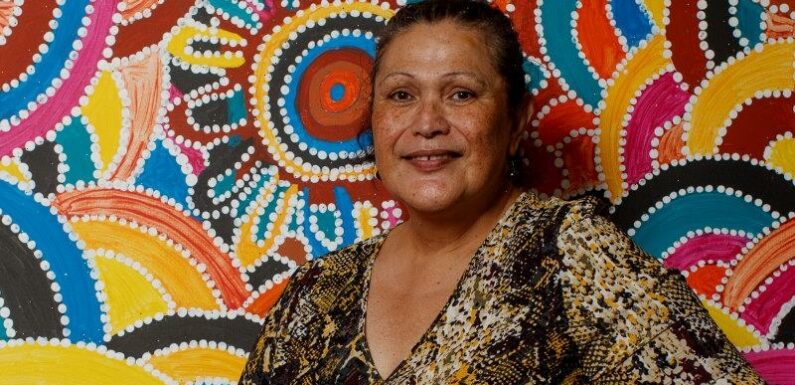
Australia is being urged to use its diplomatic and economic clout in the Pacific and South-East Asia to push for progress on LGBTQI rights and commit millions more to fund grassroots groups driving change in neighbouring countries.
As Sydney celebrates hosting World Pride, a coalition of eight civil society and philanthropic groups is calling on the federal government to make promoting lesbian, gay, bisexual, transgender, queer and intersex rights a foreign policy priority and reject using a reluctance to lecture countries as an excuse for inaction.
Samoan-born transgender woman Ymania Brown is urging Australia to make advancing LGBTQI rights a foreign policy priority. Credit:Nikki Short
Gay, lesbian and transgender people are among the most marginalised citizens in the Asia-Pacific, and consensual same-sex sexual relations remain illegal in Papua New Guinea, the Solomon Islands, Samoa, Tonga, Palau, Tuvalu and Kiribati.
A detailed report to be released on Monday finds Australia spent just $700,000 on grants for LGBTQI rights work outside of Australia in 2019 and 2020. That is far below the Netherlands, Sweden and Canada which spent $75 million, $34 million and $25 million respectively.
Ymania Brown, a Samoan-born transgender woman and human rights activist, said Australia could make a “huge difference” in the region if it took a more active stance.
“Australia provides a massive amount of development aid to the Pacific and Asia-Pacific,” she said. “It plays a leadership role in so many other areas so why not on LGBTQ rights?”
Brown, who has two adopted children, said Foreign Minister Penny Wong was ideally placed to drive change on the issue. “To have an Asian, lesbian minister from Australia leading on foreign affairs is someone the Asia-Pacific can look up to,” she said.
Foreign Affairs Minister Penny Wong with Pacific leaders last year.Credit:Joe Armao
Brown said World Pride should be a vehicle to promote human rights across the region as well as celebration and partying.
The coalition of groups – the Pacific Sexual and Gender Diversity Network, the Asia Pacific Transgender Network, the Global Philanthropy Project and Equality Australia – is calling on the government to provide targeted funding of $15 million a year to local LGBTQI civil society groups in the Asia-Pacific.
It is also calling on the government to appoint a special envoy or other high-level representative dedicated to LGBTQI rights and establish an expert advisory panel to guide its work.
Australia is easily the biggest provider of development grants and loans to Pacific nations, according to the Lowy Institute.
Ryan Silverio, executive director of the ASEAN sexual orientation, gender identity and gender expression caucus, said South-East Asia still largely remains a “hostile environment” for many LGBTQI people.
“We always look at Australia as a big LGBTQI-friendly neighbour that has been committed to human rights, to development assistance, to raising these issues in multilateral forums,” Silverio said.
“But beyond political talking we need resources. More assistance from Australia would matter a lot.”
Silverio, a leading Philippines human rights activist, said it was understandable that Australia would feel reluctant about preaching to developing nations about social issues, especially given many neighbouring countries are deeply religious.
That is why it should focus on funding and empowering local groups with on-the-ground expertise, he said.
A Department of Foreign Affairs spokesperson said: “Australia is committed to advancing human rights, including LGBTQI+ rights, globally.
“The Australian government has announced a new Human Rights Ambassador who, alongside the Ambassador for Gender Equality, will work to protect and promote human rights globally, including the LGBTQI+ community.
“Working with civil society and community representatives will be a core element of the new ambassador’s role.”
Equality Australia executive director Anna Brown said Australia had played a strong role in promoting LGBTQI rights through forums such as the United Nations Human Rights Council, but should take more practical action.
“In our region, we know LGBTQI+ people are more likely to be poor, homeless and struggle to get health care,” she said.
“The Australian government has a responsibility to be a responsible partner in the region, including by supporting the most marginalised.”
Isikeli Vulavou, executive director of the Pacific Sexual and Gender Diversity Network, said LGBTIQ citizens feel left out of the concept of a “Pacific family”.
“If we were really part of the family they would talk about our issues,” Vulavou said. “This is something we want as citizens of our countries; it is not being pushed on us by Australia or New Zealand.”
Vulavou said discrimination against LGBTIQ people in the Pacific could largely be attributed to the arrival of Christianity through western colonialism.
Countries such as Samoa, Tonga and Tahiti traditionally had understandings of gender extending beyond the male-female binary. In Samoa, for example, individuals who are born male but live as women have been recognised as fa’afafine for centuries.
Cut through the noise of federal politics with news, views and expert analysis from Jacqueline Maley. Subscribers can sign up to our weekly Inside Politics newsletter here.
Most Viewed in Politics
From our partners
Source: Read Full Article

